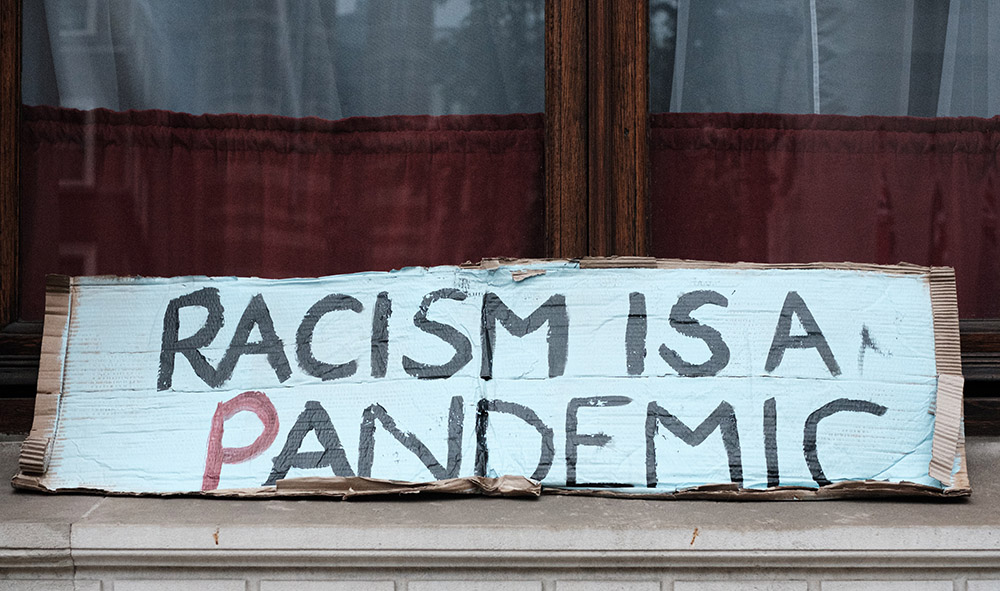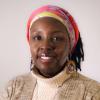
(Unsplash/Ehimetalor Akhere Unuabona)
A few weeks ago, U.S. Vice President Kamala Harris said she didn't believe the United States is a racist country. This past week, I heard a woman religious declare that polarization and a violent disregard for one another are the main problems facing the world. But when I listened to President Joe Biden addressing the senate — as Republican lawmakers refused to address policy that would help their constituents — what I saw looked more like the theatrics of white power and privilege.
As they say in Africa, when two elephants fight, it is the grass that suffers.
The grass suffers when our vice president and our religious leaders deny that this country is deeply racist. Indeed, our entire world is deeply racist. It is worth noting that Harris' own ascent to power — and President Barack Obama's before her — happened before that of any Native American or American descendant of slavery.
The religious sister who named "polarization" as our biggest problem is ignoring what led to the lack of representation of people of color in the ranks of church and religious life over the years and more so in the institutional hierarchy. Inclusivity often translates to white people making space for other people, but never transferring power (read: resources) to others to create an equitable table.
Moreover, there always seem to be a whole lot of unspoken rules that the minority, the oppressed, the vulnerable, the BIPOC (Black, Indigenous, and people of color) have to adhere to in order to be included and stay included.
As Biden addressed the Senate, I was struck by how he constantly appealed to making the United States the best and the greatest, seeming to deliberately imply that China and other countries shouldn't hold such positions. Why is this so? What makes this country believe its citizens (read: white Americans) are the only people who should be world leaders?
We just spent four years of being unable to deny that the United States' reign as "greatest country in the world" — achieved through threats, intimidation, war, exploitative and extractive politics — is essentially over. The destabilization of Latin American countries by leaders trained in combatant tactics in Fort Benning, Georgia. The logistical and intelligence support rendered to various factions according to the United States' interests that has rendered Yemen completely destitute. The war in Iraq that led to so many innocent civilian casualties and destroyed entire cities and villages.
As I write this, a crisis continues to unfold in Palestine, as Palestinians endure violence supported and funded heavily by the U.S. Many religious people have made pilgrimages to the Holy Land, but how many of us have paused to reflect on the story of that occupied land? To reflect on the colonial apartheid that continues to be used to maim, destroy and oppress, a story very similar to what BIPOC people experience in this country. Yet again, just as Black people, Palestinians are being told there is no right way to protest, to agitate, to demand their basic human rights, to be treated as equal.
You see, the U.S. and other predominantly white countries continue to fearmonger when they make us believe that they are the lesser of two evils when it comes to world domination. It is all smoke and mirrors. No country, or individual, should have dominance over another — especially when they haven't cleaned their own house and are not willing to fess up to the truth of their own history: which is that racism runs deep in this country, and it not only affects domestic policy but also shapes foreign policy.
Advertisement
Many of us from the global south were not surprised at the lack of response from wealthier countries to the COVID-19 crisis in India. When the pandemic first broke out, many experts were quick to predict that the virus would wreak havoc in Africa, parts of Asia and Latin America. These predictions did not lead to any mitigation efforts or offers of support from world leaders.
In fact, as of May 15, the number of vaccinated people in the entire continent of Africa, apart from Seychelles, Morocco and Mauritius, is five or fewer to every 100 people. We come from countries where drugs and chemicals that have been banned in the Western countries are dumped with devastating consequences.
We know that despite there having been an experimental drug called ZMapp that was used to treat the first infected Americans after the Ebola outbreak of 2017 (a drug that was initially denied to an eminent and leading Liberian physician who died), ZMapp is still not mass-produced or distributed. Yet Ebola continues to rear its ugly head in Africa.
Closer to home, it is the fact that research into sickle cell disease, which predominantly affects people of African ancestry, is grossly underfunded. On the other hand, cystic fibrosis, which predominantly affects white Americans at lower prevalence than sickle cell disease affects Black Americans, receives up to seven times more research funding per patient.
Thus, Black, Indigenous and people of color have come to look at white altruism as a vehicle for hidden, often insidious, motives. Help is given with strings attached, which, in the long run, leaves us more disadvantaged. When you hear those in power asking why then we can't get our acts together in our own countries, think of colonialism, think of the slave trade, think of extractive and exploitative politics.
Think of eastern Democratic Republic of Congo, which has not known peace for decades and yet somehow produces some of the highest quantities of coltan, which is used in our electronics. Think of the fact that France is still supported by its former colonies to date.
But most of all, think of the fact that any country perceived as a threat to the world's so called "leading democracies" is met with embargoes and worse.
I propose that many of our world problems stem from racism and white supremacy disguised as white saviorism. An acknowledgement of that in this country, in our church and religious communities would be a good starting point.
An anti-racism stance would mean justice such as reparations in the form of redistributing of resources, shifting of power; it would mean truth-telling through listening to the aggrieved, respecting their opinions and value systems instead of talking and rushing yet again to solutions that are one-sided.
It would also mean admitting that capitalism as it exists and all its benign-sounding tagalongs such as "structural readjustment programs" and free trade causes more harm than good. It would mean safety and security for those who have never experienced that reality, either individually or as communities, which then translates into true and lasting peace.







